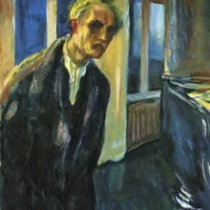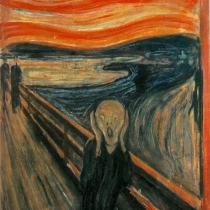 1863 - 1944
expressionism, symbolism
1863 - 1944
expressionism, symbolism
Description Edvard Munch
Edvard Munch, born in 1863, cradled the shadows of his own psyche in his art, becoming a luminary of Expressionism. His childhood, marked by tragedy and illness, imprinted a profound darkness on his soul. Munch's early works, like "The Sick Child," foreshadowed the psychological depths he would later plumb.
Munch's art, oscillating between realism and abstraction, captured the emotional pulse of existence. His masterpiece, "The Scream," an iconic expression of existential angst, transcended paint on canvas to become a universal symbol of human vulnerability. Munch once stated, "I paint not what I see, but what I saw."
Haunted by themes of love, death, and the human psyche, Munch delved into the subconscious. His exploration of love's complexities, as seen in "The Madonna" and "The Vampire," exuded a visceral intensity. The recurring motif of death, epitomized by "The Dance of Life," echoed his fascination with life's transience.
Munch's life mirrored the turbulence of his art. Personal losses, mental health struggles, and societal rejection shaped his journey. Yet, from the crucible of suffering emerged artistic innovation. His contributions to Symbolism and the formation of the Expressionist movement echoed in the works of later visionaries.
Munch's relationship with the bohemian circles of Berlin and Paris ignited creative sparks. His symbolic language, characterized by distorted figures and bold colors, defied artistic norms. The emotional potency of his art, rather than adherence to formal conventions, became the beacon guiding subsequent generations.
As a recluse in his later years, Munch continued to paint, embracing solitude. His legacy, however, extended beyond the canvas. The Munch Museum in Oslo stands as a testament to his enduring influence, showcasing not only his art but the very soul of a tormented visionary who sought to unveil the raw essence of human experience. In the strokes of Munch's brush, the echoes of his inner struggles and the timeless resonance of his artistic vision persist, an invitation to confront the profound complexities of the human condition.
Gallery
Paintings Edvard Munch
Quotes
I do not believe in the art which is not the compulsive result of Man’s urge to open his heart.
Nature is not only all that is visible to the eye... it also includes the inner pictures of the soul.
Illness, insanity, and death were the black angels that kept watch over my cradle and accompanied me all my life.
From my rotting body, flowers shall grow, and I am in them, and that is eternity.
My art is rooted in a single reflection: why am I not as others are?

No Comments Yet...